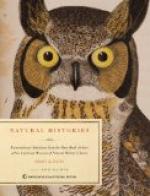must be arrived at in the case of all but two species,
which constitute a little group distinguished by what
is apparently a special organization adapting them
to this peculiar diet. These wretched little
beasts, which only measure two and a half or three
inches in length, are furnished in the upper jaw with
a single pair of incisor or front teeth, but these
are of great size and strength, triangular in form,
and so excessively sharp that when the creatures are
seized they can draw blood from the hand of their
captor by what seems a mere touch. This extreme
sharpness of their weapons enables them, when attacking
sleeping men or animals, to slice off a small portion
of skin almost without causing any pain, and the little
oval wounds thus produced, like the similar surface-cuts
which a careless shaver sometimes inflicts upon his
chin, bleed with particular freedom. The Desmodonts,
as these true Vampires are called, will attack horses,
mules, and cattle, which they generally wound on the
back, near the spine, often in the region of the withers;
and they also bite the combs of domestic fowls, and
any part of the human body that they can get at.
In the case of man, however, according to most authorities,
the extremity of the great toe is the favorite part;
and some writers, perhaps possessed of a strong poetical
vein, have given wonderful descriptions of the artfulness
with which these little blood-suckers make their approaches,
and keep their victim comfortably asleep during the
operation by fanning him with their wings. In
fact, the Vampire Bats had so bad a reputation from
the accounts given by travellers, that they seemed
to be veritable scourges of the countries in which
they live, but so far as can be made out from the most
trustworthy reports, the mischief they cause may be
summed up under two heads, namely, weakness produced
by loss of blood, which continues to flow from the
wounds long after the Bats have drunk their fill and
gone quietly home to rest, and inflammatory affections,
caused either by the irritation of the bite in the
case of people of a bad habit of body, or by the friction
of the saddle or collar upon the part bitten in the
case of horses and mules, or of the shoe in the human
patient. That the Desmodonts do really feed on
blood is proved by evidence of various kinds.
They have been captured in the act of blood-sucking,
when their stomachs, which are peculiarly constructed
and very long, are found filled with a black paste,
which is evidently half-digested blood; and their
teeth, which are in part so well adapted for producing
the necessary wounds in other animals, are totally
unfit for the mastication of an insect prey, such
as constitutes the diet of their nearest allies.
[Illustration: THE VAMPIRE BAT.]




